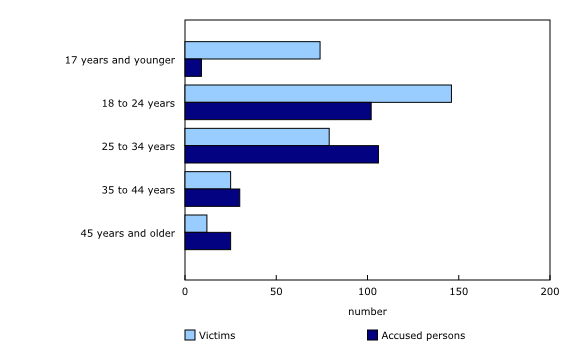Police report a record high number of human trafficking incidents in Canada in 2019
Archived Content
Information identified as archived is provided for reference, research or recordkeeping purposes. It is not subject to the Government of Canada Web Standards and has not been altered or updated since it was archived. Please "contact us" to request a format other than those available.
Released: 2021-05-04
There were over 500 incidents of human trafficking reported by police in Canada in 2019, up 44% from a year earlier. At 1.4 incidents per 100,000 population, the 2019 rate was the highest since comparable data became available in 2009.
Over the past decade, the annual number of human trafficking incidents reported by Canadian police trended upward. These increases may represent actual growth in human trafficking activity, but may also reflect better training among police to detect the crime, as well as recent efforts to strengthen mechanisms to combat it. These efforts may increase awareness of this crime, and in turn, contribute to more willingness to report such incidents. While on the rise, human trafficking represented a small proportion (0.02%) of criminal activity reported to police in 2019.
The Juristat Bulletin—Quick Fact "Trafficking in persons in Canada, 2019" is now available. This bulletin examines human trafficking based on data from Canadian police services and criminal courts. Information on the characteristics of police-reported incidents related to this crime is presented, including the characteristics of victims identified in human trafficking incidents.
About two out of three human trafficking victims are girls and young women
Police-reported data indicate that human trafficking is a crime that primarily target girls and women. Of the 336 victims of Criminal Code human trafficking violations reported by police in 2019, the vast majority (95%) were girls and women. More than one in five (21%) victims were girls aged 17 and younger and 43% were young women aged 18 to 24.
Human trafficking incidents less likely to be solved than other violent crimes
While 58% of all violent Criminal Code incidents reported to the police in 2019 were cleared—that is, the incident was considered solved by the police—a smaller proportion (38%) of human trafficking incidents were cleared.
About 8 in 10 (83%) people accused in human trafficking–related incidents were men, and most were aged 18 to 34.
Most human trafficking court charges are stayed, withdrawn, dismissed or discharged
Human trafficking is complex, and this is reflected not only in the proportion of incidents that are solved by police, but also in how human trafficking cases are handled in courts. According to the Integrated Criminal Court Survey, 104 completed cases involving at least one charge for a human trafficking offence in 2018/2019 were processed in adult criminal courts in Canada. In total, these cases involved 1,850 charges, of which 19% (or 356 charges) were for human trafficking. In 2018/2019, a human trafficking–related case involved an average of 18 charges, compared with an average of 4 charges per case for violent crime cases in general.
Sex trade–related offences accounted for one-quarter of the charges laid in cases involving human trafficking charges. Other charges commonly linked to human trafficking cases included sexual offences (9%) and physical assault (7%).
Less than 1 in 10 (7%) human trafficking charges resulted in a guilty finding, compared with 31% of violent offence charges in all cases overall. Instead, the vast majority (89%) of human trafficking charges were stayed, withdrawn, dismissed or discharged.
Note to readers
Trafficking in persons, also known as human trafficking, involves recruiting, transporting, transferring, receiving, holding, concealing or harbouring a person, or exercising control, direction or influence over the movements of a person, for the purpose of exploiting them or facilitating their exploitation.
Police-reported human trafficking data include Criminal Code offences and violations against the Immigration and Refugee Protection Act. In this article, incident counts are based on aggregate data, while incident, victim and accused characteristics are based on microdata from the Uniform Crime Reporting Survey.
Police services can report up to four violations for each incident. Calculations for accused persons are based on incidents where human trafficking was any violation in the incident, while analysis of victim information is based on Criminal Code human trafficking incidents only, where human trafficking was the only or the most serious violation in the incident.
Data from the Integrated Criminal Court Survey include human trafficking charges under the Criminal Code only. A completed case is one or more charges against an accused person or company, which was processed by the courts at the same time and received a final decision. A case is not deemed complete until all charges in that case are disposed of (i.e., have received a final decision).
Stays, withdrawals, dismissals and discharges include those at preliminary inquiries as well as court referrals to alternative or extrajudicial measures and restorative justice programs. These decisions all refer to the court stopping criminal proceedings against the accused. A stay is a specific type of stoppage directed by either the Crown or a judge. For example, a court may institute a stay in response to a Charter challenge due to unreasonable delay, i.e., a Jordan application.
More information on the number of human trafficking incidents reported in 2019, by geography, can be found in the following tables on the Statistics Canada website: 35-10-0177-01, 35-10-0178-01, 35-10-0179-01, 35-10-0180-01, 35-10-0181-01, 35-10-0182-01, 35-10-0183-01, 35-10-0184-01, 35-10-0185-01.
Products
The article "Trafficking in persons in Canada, 2019" is now available as part of the publication Juristat Bulletin—Quick Fact (85-005-X).
Contact information
For more information, or to enquire about the concepts, methods or data quality of this release, contact us (toll-free 1-800-263-1136; 514-283-8300; STATCAN.infostats-infostats.STATCAN@canada.ca) or Media Relations (613-951-4636; STATCAN.mediahotline-ligneinfomedias.STATCAN@canada.ca).
- Date modified:


